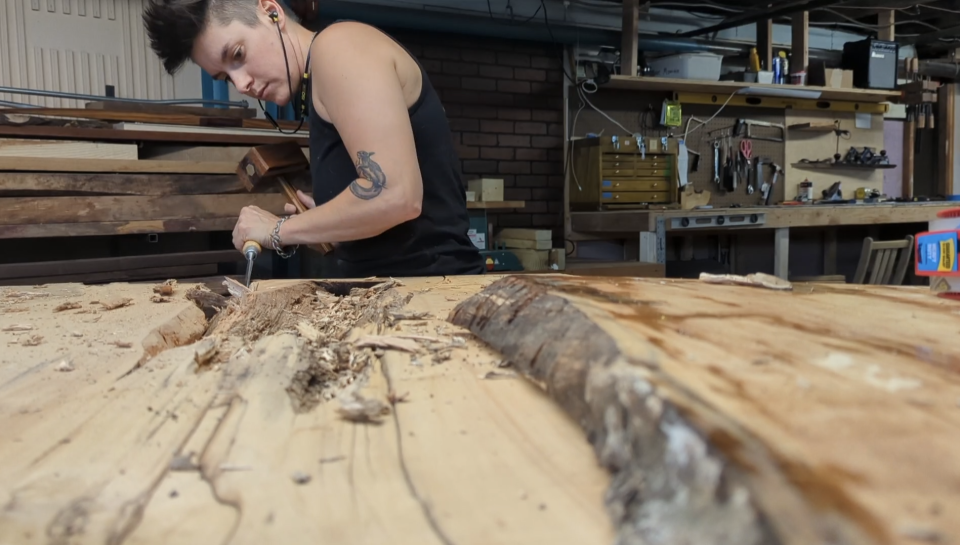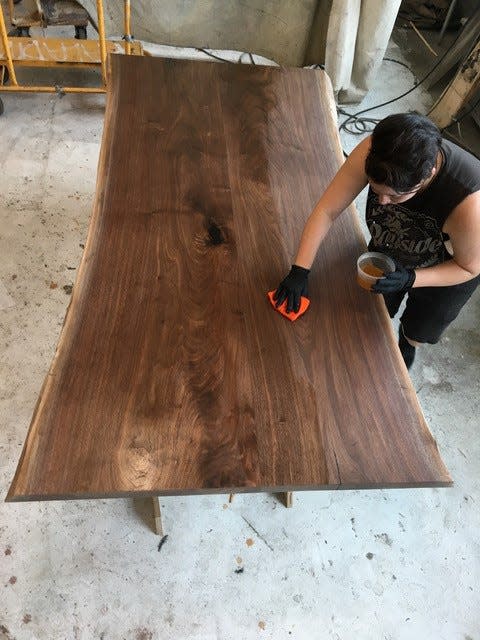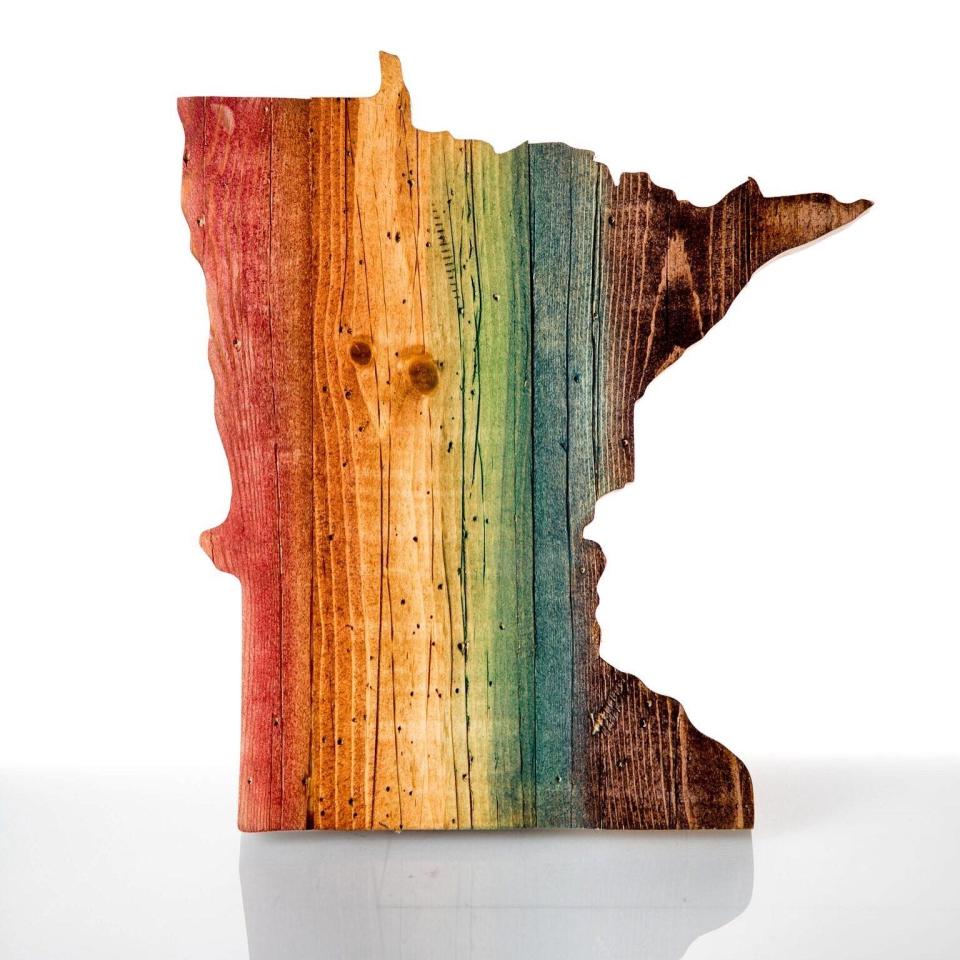'We celebrate each other': LGBTQ, female woodworkers aim to carve out more space in a field built for men
Walk into any home improvement store, and you’re immediately confronted with a space and industry built for one certain demographic: men.
The size of a brick. The weight of cement bags. The grip size of power tools. They’re all “designed for the male body,” said Erinn Carter, co-founder of Frailty Myths, an organization that provides workshops centered on leadership, diversity, equity and inclusion.
Carter and her team have set out to help make women and members of the LGBTQ community feel comfortable and accepted in these male-centered spaces – particularly through woodworking workshops.
They are among a group of artisans who are opening doors for more LGBTQ and female woodworkers to enter the industry by increasing community visibility, growing online spaces and offering accessible workshops.
IT'S PRIDE MONTH: Read all of USA TODAY's 2022 Pride coverage here
In one of Frailty Myths' classes on picking supplies at Home Depot, attendees are walked through how to respond when employees or other customers question their judgement because of their gender presentation. Carter and her co-founder, Georgia Faye Hirsty, said this workshop and others help dispel the assumption that woodworking is just for men.
"There is nothing about woodworking that is inherently masculine, and if you identify as feminine and you are woodworking, then that's feminine," Hirsty told USA TODAY.
Diverse woodworkers gain new spotlight
Women and gender nonconforming people have always been woodworkers – their work has just been minimized and called different names throughout history, said Deirdre Visser, author of "Joinery, Joists and Gender: A History of Woodworking for the 21st Century."
"Two people can be doing the exact same thing, and in one case, we call it homemaking, and then the other case we call it craft with capital 'C,'" Visser said.
Shifts in gender equity and growing visibility for the LGBTQ community have increased accessibility for diverse artisans, Visser said.
Michigan wood art and furniture maker Megan Shannon said she's often felt she needed to prove herself as a lesbian woman in woodworking because of her gender.
"It's really hard to connect with people in any kind of trade like this when you instantly feel like you are inferior to them just because of your sex, or your race, or your financial status," Shannon said.

Many women and LGBTQ woodworkers have now found a visible community on social media like TikTok, which gives artists and workers a space to connect with other queer woodworkers – and customers – around the world.
A scroll through "#queerwoodworker" or "#woodworkHER" on the app shows time-lapse videos of creators cutting and sanding their pieces, as well as users reenacting sexist interactions they've had because of their gender, such as men in hardware stores assuming they don't know what materials they need for a project.
Kathryn Sullivan is a classically trained cabinet maker based near Dallas whose work includes custom furniture building, repair and restoration. Sullivan has found support for her work and instructional videos on TikTok from other LGBTQ creators.
"There's a very strong queer community online and it's very supportive: toolmaking, craftmaking, tradespeople, the artistic community," Sullivan said. "We celebrate each other, and we celebrate what each other has made."

EJ Duff-Berger, a queer, gender nonconforming furniture maker based out of Philadelphia, said the queer woodworking online community has been "phenomenal" for collaboration.
Duff-Berger, 32, is the founder of Hurricane Woodwork and said they've worked with other LGBTQ woodworkers and allies to raise money for young queer artists.
Women made up only 3.1% of carpenters and 5.8% of cabinet makers in the United States in 2020, according to the Bureau of Labor Statistics. For the LGBTQ community, most population surveys – including the bureau's Current Population Survey – neglect to ask respondents questions about sexuality and gender identity, leaving a gap in data collection on queer representation in most industries.
MARIJUANA INDUSTRY: LGBTQ people helped create the legal weed industry. Then they were left behind.

Creating a welcoming space for LGBTQ, female woodworkers
To expand the space and opportunities for nonmale woodworkers, galleries like the Center for Art in Wood in Philadelphia have been hosting events and discussions aimed at connecting LGBTQ woodworkers and advocating for greater representation.
Shannon, the Michigan woodworker, and Amelia Christensen, a nonbinary queer woodworker and founder of A. Miyuki Studio in Brooklyn, are among those who have hosted classes targeting women and nonbinary woodworkers. Offered at varying skill levels and with financial aid options, the classes aim to encourage more female and gender-diverse individuals to feel like they can enter and succeed in the industry.
PRIDE IN RURAL AMERICA: Surge in small-town Pride events helps LGBTQ folks find home. Is it enough?

Christensen said that more spaces like these are needed to expand woodworking to people who aren't straight or cisgender (people whose gender corresponds with their sex assigned at birth).
“We all want a place that feels comfortable and safe to learn," they said. "I think the biggest barrier of entry is that it's a field that is predominantly dominated by cisgender white men. It was really, really great to be able to create that space for somebody else, just knowing how important it feels.”
Other women and LGBTQ artisans work to provide affirming spaces not just for other woodworkers but also for their queer customers.
Sisters Nikki Hollerich and Anna Hagen run a Minnesota-based woodworking business, Hagen and Oats, and show their support for the LGBTQ community by selling rainbow-stained wood pieces called "stainbows," donating 10% of the sales to local LGBTQ+ affirmative organizations.

"I feel like our customer base ... they know that they can feel safe with us and that we've created a safe community in both our employees and in our customers," Hagen said. "I think we try and send that message both overtly and covertly."
But work remains to be done to make the field more accessible and expand opportunities, Christensen said.
“Spaces are few and far between, but there are spaces that are more welcoming and inviting," they said. "And hopefully anyone who's interested in woodworking as a profession or as a hobby, I really encourage them to continue to seek out those spaces and hopefully help them grow."
More Pride month 2022 stories from USA TODAY
LGBTQ books are being banned from schools. Here's how kids can still read them.
Why do so many Gen Zers identify as LGBTQ? Because of the sacrifices of prior generations, experts say
TikTok: How one video started a movement to support LGBTQ couples on their wedding day
Hiding behind rainbow flags: These companies' political donations don't match their support of LGBTQ issues
This article originally appeared on USA TODAY: During Pride, LGBTQ, female woodworkers challenge male-dominated field

 Yahoo Movies
Yahoo Movies 